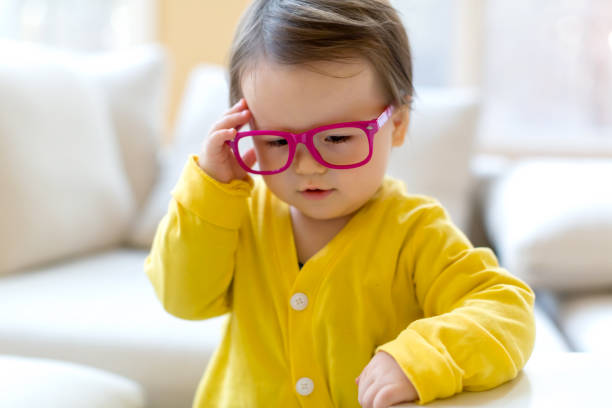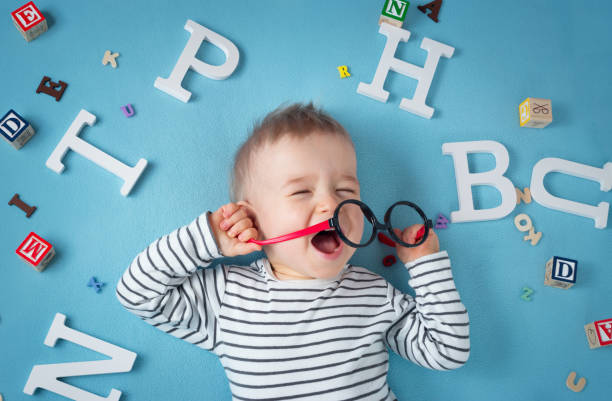You will take your newborn child to the pediatrician for wellness checks during the first few months of life, where nearly everything, including their vision, will be examined and tracked for any abnormalities. Thankfully, most babies don’t require corrective lenses, and any vision issues usually disappear by the time they are toddlers. We have put together a quick guide to assist you in recognizing any signs that your child might need glasses. To learn more, keep reading.
Table of Contents
Signs Your Child Might Need Glasses
Squinting
If your child squints a lot, they may have a refractive error, which impairs their ability to focus on objects clearly. Your child might be able to temporarily sharpen the focus and clarity of an object by squinting.
Tilting Head Or Covering One Eye
If your child wants to see more clearly, he or she might cover one eye or tilt their head. This could be a sign of misaligned eyes or that your child has amblyopia, also known as lazy eye, one of the most common eye conditions in kids.
Sitting Too Close to the Television Or Holding Hand-held Devices Too Close to the Eyes
Poor vision may be indicated by lowering the head while reading, sitting too close to the television, or using handheld devices too close to the eyes. Nearsightedness, also known as myopia, causes people to have better near vision but a worse far vision. An image becomes larger and more distinct as an object is brought closer.
Rubbing Eyes Excessively
If your child rubs their eyes a lot, they might be feeling strain or fatigue in their eyes. This could be a symptom of a variety of eye conditions and problems, such as allergic conjunctivitis.
Complaining of Headaches Or Eye Pain
At the end of the day, if your child complains of headaches or eye pain, it’s possible that they were straining their eyes too much in an effort to improve their blurry vision.
Having Difficulty Concentrating on School Work
Children who have vision problems may find it difficult to concentrate on their schoolwork because they must quickly and accurately change their visual focus from far to close-up and on a variety of different objects, including chalkboards, computers, textbooks, and tablets.
Doesn’t Follow Objects
One of the tests that eye doctors use for infants is the “fixate and follow” test. At three months old, infants should be able to focus on and follow an object around. Your pediatrician will perform a more thorough evaluation if, by the time they are four months old, your baby is unable to follow objects.

Does My Baby Need Glasses?
Parents frequently inquire about how to tell if a baby needs glasses because we can’t expect such a young child to read a chart. Many pediatricians will use equipment that resembles cameras to screen pre-verbal and pre-reading children at a routine checkup to identify an early need for glasses. While these tools are very good at detecting changes in the eyes that might indicate a child needs glasses, they can also produce a lot of false positives when there isn’t actually a problem. A pediatrician will send a child to an ophthalmologist for a thorough evaluation if the baby fails this screening test.
Don’t worry if your pediatrician doesn’t have this gadget. Your doctor may also examine your infant’s eyes in other ways. A light can traditionally be shone into the infant’s eyes to conduct an ophthalmoscope red reflex test. The reflection informs the physician about eye growth and will show whether anything needs to be examined by an ophthalmologist. If you still have concerns, ask your doctor to refer your kid to an ophthalmologist for a thorough dilated exam.
What to Do If Your Child Fails a Vision Screening?
A child’s pediatrician or school will typically perform a vision screening on them. “If your child fails a vision screening, the most import thing to do is be seen by an eye care provider for a comprehensive eye exam,” Collins says.
A comprehensive exam assesses visual acuity, or the clarity and sharpness of vision, and may also check for:
- Strabismus (crossed eyes) and eye alignment
• Depth perception
• The overall health of the inside and outside of the eye
• Indications of more serious eye conditions
It’s crucial to have your child’s eyes examined by an eye care professional once a year even if they already wear glasses.
The ability to see clearly is necessary for learning. The range of issues that children of school age can encounter due to poor vision is often underestimated. As a result, it’s critical to understand your child’s overall eye health and what you can do to protect it.
Advice for Parents of Babies
Do your best to avoid searching for any serious health issues, including those involving vision. Online resources don’t take your child’s unique situation into account, and no two people’s medical needs are ever the same. Ask your doctor or a knowledgeable eye care professional any questions you may have.
Close Note: Check In Time
Even though the aforementioned symptoms are uncommon, they probably can’t be treated with just glasses if they do show up. If your child displays any of these symptoms, we strongly advise that you speak with an eye care specialist to have your child evaluated and discuss your treatment options.
Please speak with your healthcare provider for more details on how your baby’s vision will change during the first year of life. The best thing you can do for your baby’s comfort and your peace of mind is to get them checked out as soon as possible if you suspect they need glasses or are having trouble seeing.
